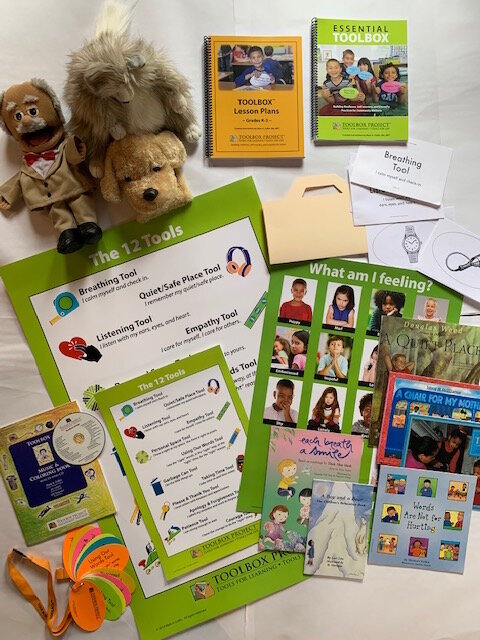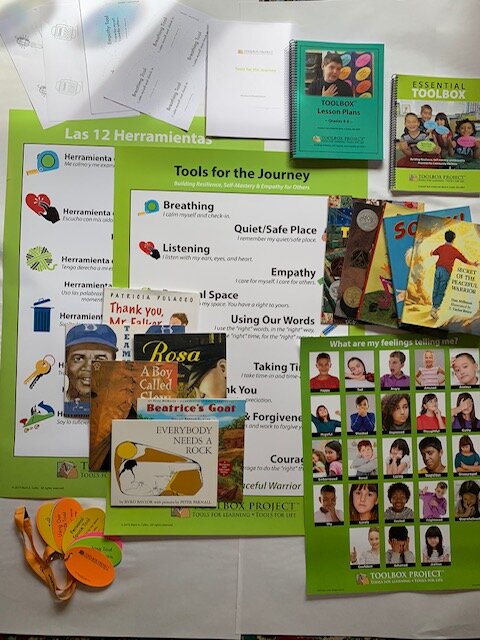Toolbox Project Materials
Any materials with an (*) in the title indicates that those materials are offered in English and in Spanish or a Spanish/English combination.
PLEASE NOTE: Due to a high volume of inquiries and orders at this time please allow 24-48 hours for us to respond to you regarding your request.
*Essential Toolbox Guide K-6 : Describes the core framework for the philosophy, pedagogy and key principles. Lessons include inquiry questions and imagination practices for the implementation of the common language and strategies behind the experience of the 12 Tools. Illustrates strong support for a whole child approach, equity, personal awareness, social intelligence and wellness, theory of resilience, Common Core Standards, and PBIS. Explores additional children's literature for introducing each Toolbox Project Tool, online portal information and implementation timeline. The Essential Toolbox includes an introduction and background to: What is Toolbox Project?, 12 Tools: Lesson and Practices, Toolbox Project Way- Pedagogy, How to Implement Toolbox Project and Creating the Foundation.
Toolbox Lesson Plans (K-3) + (4-6): In addition to what is provided in the Essential Toolbox, the Toolbox Lesson Plans provide a full range of instructional activities and practices for teaching Toolbox Project. Lessons include in depth exercises for each of the 12 Tools with expanded and additional examples, inquiry questions, keyword vocabulary, imagination practice, instructions on using selected children’s literature to introduce each Toolbox Project Tool, student journal prompts, home connection activities, role play (4-6), puppet work (K-3), “Me” and “We” activities, pair- share questions, circle activities, expressive arts, academic integration, and to guide student instruction.
Circle of Friends Guide: Counselor/ facilitator led small group lesson plans designed for small pull-out groups of 3-8 students (depending on group dynamics) experiencing higher levels of ACEs or trauma in grades K-6. The group focus is on building self-awareness and self regulation using Toolbox Project Tools. Specific students will benefit from this more focused opportunity to use their tools when issues arise regarding a student's self-defeating behavior towards self or others, or when the classroom Toolbox Project lessons are not sufficient to support a behavior shift. A skills assessment sheet is provided to help facilitators assess individual student's strengths and areas that need practice. An additional in-depth children’s literature book list is also included.
Administrator’s Guide: This guide is for administrators, directors, principals or SEL leaders. The Administrator’s Guide introduces Toolbox Project pedagogy and school-wide approaches, including its common language, inquiry-based approach, academic integration, positive behavior strategies, connection to Common Core State Standards and research, as well as appendices of best practice implementation strategies.
Manilla Toolboxes (K-3): The manilla Toolbox cutouts are essential for the success of Toolbox Project in the lower grades. They make the 12 Tools concrete and help younger students (K-3) have pride and personal ownership by giving them a tangible cardstock Toolbox they can color and make their own.
*Tool Cards (K-3) + (4-6): We have two types of Toolbox Project Tool Cards. Our K-3 Large Tool Cards come in a set of 12, one card per Toolbox Project Tool. These Large Tool Cards are given to each K-3 student to personalize and put into their Manilla Toolbox (see above). Our 4-6 Small Tool Cards also come in a set of 12 cards. Students typically use these cards to create their own version of a Toolbox Project Fan Deck (see below).
*Student Journals (4-6): Journals become a written and/or illustrated record of each student’s personal journey or narrative for each Foundation activity and Toolbox Project lesson
*K-6 Fan Decks: Laminated lanyards of the 12 Tools are indispensable in helping make the Toolbox Project Tools concrete for students and adults. Essential for empowering students and creating the common language of Toolbox Project in a school, family, or community.
Posters:
*12 Tools (K-3) + Tools for the Journey (4-6): These posters are critical in creating an ongoing visual reminder within the classroom and community for the common language and experience of Toolbox Project: posters include the name, tag line, and icon for each Toolbox Project Tool.
Feelings Posters (K-3) + (4-6): Our Feelings Posters are available in two versions one geared for students in grades K -3 and one for students in grades 4-6. These posters give students a visual representation of the variety of emotions that they may feel on any given day. The K-3 poster has 15 different emotions represented whereas the 4-6 poster has 23 different emotions.
Book Sets-( K-1) + (2-3) + (4-6) + (K-6) + (Circle of Friends): Each book set option is a collection of published children’s literature that incorporates core TOOLBOX™ concepts. Book sets can be purchased through Toolbox Project. Book selections are incorporated and used to reinforce when teaching Toolbox Project strategies and practices .
K-3 Puppet Set: Puppet sets are used to create a meaningful and transformative interactive dialogue and role play scenarios. Puppet role play is a way for students to fully experience and understand the difficult situations arising in their daily lives. The puppet set comes with four puppets, each with their own personality and identity.
Toolbox Project Coloring Book (includes Music CD): Our Toolbox Project Coloring Book, for younger grades (TK-1), has a coloring page and a song to go along with each of the 12-Tools. Each song was written and produced by Mr. Music (Jim Corbett) who is the founder of the Mr. Music Foundation. All drawings were done by Alice Teagarden, a local Sonoma County artist.
Toolbox Project Portal: Our portal is for those that have purchased training and/or materials. Through our portal people have access to templates for print material, individual lesson plans, teaching documents, student and family handouts, powerful Toolbox Project videos, and additional resources for the implementation and facilitation of Toolbox Project.


